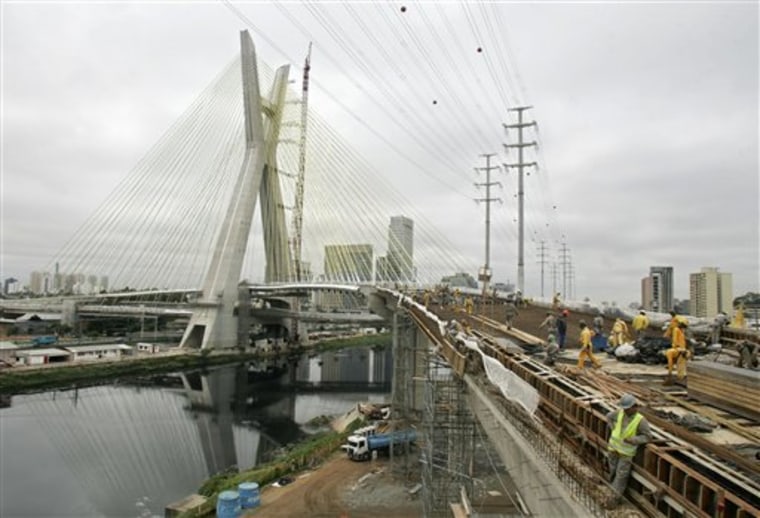Brazil's booming economy is shifting into overdrive, with biofuels and deep-water oil providing energy independence and the government collecting enough cash to irrigate the desert and pave highways across the Amazon.
The country's currency is strong, its exports are booming and its foreign debt is gone. The economy is growing at more than 5 percent a year and millions of people with new access to credit are buying homes and cars. Topping off all the good news, an energy official said this week that a newly discovered oil field could be the world's third-largest.
For decades, Brazilians have felt their once-backward nation deserved a starring role on the world stage. Now it may be getting one.
"Brazil is finding its place in the world," said Luiz Barboso, wearing a hardhat as he helped supervise 500 workers on a towering, $76 million bridge complex in Sao Paulo, the nation's capital of industry and finance. "It's great for the people, and it means more work and more money."
Of course, Brazil is grappling with giant problems firmly rooted in the developing world, including enduring poverty, urban violence and widespread political corruption. But Monday's news provided hope that a new prosperity could begin to address those issues.
Brazil's top oil industry regulator, Haroldo Lima, told reporters that a field off the coast of Rio de Janeiro could contain 33 billion barrels of oil. That would be bigger than any oil find in decades, and would triple Brazil's oil reserves.
The state-run oil company Petroleo Brasileiro SA cautioned that offshore oil deposits are notoriously hard to measure, let alone extract. But investors betting on a mother lode sent Petrobras stock up nearly 10 percent in a day.
"We're already doing well, and if I look ahead, I think it will only get better," said Antonio Bonchristiano, the Brazilian co-chief of GP Investments, Latin America's largest private equity firm. He spoke this week at an economic forum in Cancun, Mexico, where excited investors compared notes on Brazil's potential.
The U.S. ambassador to Brazil, Clifford Sobel, said there's no end in sight because Brazil appears to have left its boom-and-bust economic cycles behind.
"As long as they have the ability to have a stable environment where people can make long-term, secure investments, and as long as commodities ... are strong in the global arena, Brazil will continue to grow and prosper," he told The Associated Press.
And this boom could translate into power beyond the economic realm.
"Long-term, Brazil is going to be a major petroleum power," said David Fleischer, a political scientist at the University of Brasilia. "It will enhance its importance in South America and the world as an energy supplier — and that translates into political power."
Fleischer said a greater role on the political stage could help diminish the influence of Venezuela's leftist president, Hugo Chavez. It also could help Brazil join influential world bodies such as the Group of Eight industrialized nations, and maybe win it a permanent seat on the U.N. Security Council.
But while the economy booms, Brazil still suffers under a health system unable to prevent a dengue outbreak in Rio, drug gangs that all but govern teeming slums, and settlers and illegal loggers who burn and cut down the world's largest rain forest.
This week alone, police arrested dozens of mayors in a corruption scheme involving more than US$100 million (euro63 million) in pilfered public money. Farm workers agitating for land reform blocked a railway used to get iron ore to ports for export. And the Roman Catholic Church reported that debt slavery has increased substantially.
"Everything is great in the short term: oil production, biofuels, iron ore, airplanes," said Riordan Roett, director of Western Hemisphere studies at Johns Hopkins University. "But the education and health systems are lousy. You can get super engineers, but you can't get enough decent high school graduates."
President Luiz Inacio Lula da Silva's center-left government is trying to fix that. It is expanding a welfare program that gives monthly checks to 45 million poor Brazilians who keep their kids in school, and is pledging billions in anti-poverty money across Brazil's poorest regions.
"We're going to transform this country into a great economy and a great nation," Silva told his citizens in February.
But experts are divided on whether Brazil is in the midst of a social revolution that will break down the vast gap between rich and poor and create a much larger middle class.
"The potential is there. It looks better and better every year. We just need to get our game together in turning the potential into reality," Fleischer said.
Meanwhile, ordinary Brazilians are basking in the glow of their newfound hope. At the bridge construction site, Edivaldo Pereira dos Santos smiled as he painted a guardrail.
"The oil will give us the power," he said. "And this bridge will be a postcard for Sao Paulo, like the Golden Gate Bridge is for San Francisco."
